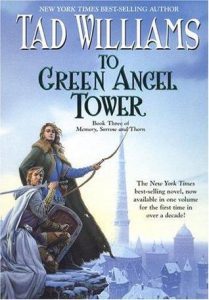Adrian Collins's Blog, page 171
June 20, 2021
REVIEW: The Fort by Adrian Goldsworthy
Adrian Goldsworthy’s The Fort has the sort of plot readers have been familiar with since the first act of Rosemary Sutcliff’s Eagle of the Ninth. A Roman fort must hold out against a siege from barbarians, pitting the familiar apparatus of the disciplined legions against looser tribal bands. Between the main cast, there are the tensions you might expect between (variously) conquerer and conquered, metropolitan and provincial, patrician and plebeian.
 Goldsworthy differs from Sutcliff in, among other things, the age of his protagonist, the levels of sex and violence and the consistent focus on the titular fort. There is no quest for the missing Eagle – there is only the fort of Piroboridava before, during and after the siege (with appropriate other excursions). In this sense, there is something rather procedural about The Fort. However, it doesn’t embrace a Tom Clancy-style cast of thousands. Instead, we get a main character, the centurion Flavius Ferox, and a counterpart in among the Dacian forces – with occasional points of view from the level of Imperial governance by Aelius Hadrianus – who will become better known as the Emperor Hadrian.
Goldsworthy differs from Sutcliff in, among other things, the age of his protagonist, the levels of sex and violence and the consistent focus on the titular fort. There is no quest for the missing Eagle – there is only the fort of Piroboridava before, during and after the siege (with appropriate other excursions). In this sense, there is something rather procedural about The Fort. However, it doesn’t embrace a Tom Clancy-style cast of thousands. Instead, we get a main character, the centurion Flavius Ferox, and a counterpart in among the Dacian forces – with occasional points of view from the level of Imperial governance by Aelius Hadrianus – who will become better known as the Emperor Hadrian.
It is one of Goldsworthy’s successes in The Fort to set it away from some of the more well-trodden bits of Roman history. The time is 105 AD, the Emperor is Trajan. The plot does not retread the Punic Wars or Julius Caesar’s Conquest of Gaul – and, indeed, is set far from Roman Britain. Trajan and the Dacian Wars are hardly unknown (Trajan’s Column in Rome is a fairly prominent monument of his conquests, and the choice of Trajan to represent Rome in Sid Meier’s Civilization VI has doubtless boosted his image) but are less than prominent in the popular imagination. Goldsworthy’s Afterword explores several points of the setting and his innovations in a way that does him credit as a historian as well as a writer.
However, there are patches where The Fort suffers. The Fort is the first of a new series, but sits at the end of a previous trilogy (the Vindolanda series) that introduced Flavius Ferox and other characters from Roman Britain. The introductions of these sat oddly with the rest of the text, at least to one who is unfamiliar with the preceding books. A submerged Celtic identity and lingering grudges were interesting features for Ferox, but the strong link between these and the former series made it all (irrationally) less mysterious than if Ferox had been a brand new character. The distant references to what looks an awful lot like a secret Pictish ninja clan were also eyebrow-raising.
I can, however, recommend The Fort. To a newcomer to Ancient Rome it will likely be entertainingly two-fisted, and there is a glossary provided. To those more familiar, it may be interesting, and highlights the Dacian Wars as an area for further study. I think Goldsworthy has reached sufficiently high on the cursus honorum to net three stars.
Read The Fort by Adrian Goldsworthy
The post REVIEW: The Fort by Adrian Goldsworthy appeared first on Grimdark Magazine.
June 19, 2021
REVIEW: Memory, Sorrow, and Thorn by Tad Williams
Memory, Sorrow, and Thorn by Tad Williams is the single best Tolkien-style fantasy not written by Tolkien. It was a huge inspiration to George R.R. Martin’s A Song of Ice and Fire series, as well as Patrick Rothfuss’s Kingkiller Chronicles. The final book of the trilogy, To Green Angel Tower, is even on a list of the longest novels ever written, so huge it had to be split into two 800+ page paperbacks.
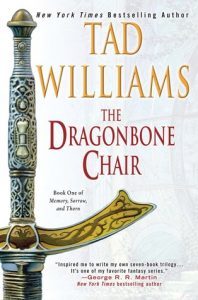 If The Lord of the Rings was the foundation of epic fantasy, Memory, Sorrow, and Thorn was its capstone. It was the perfect distillation of all of the tropes that had built themselves up around epic fantasy. The low-born kitchen boy who’s destined for great things, the princess who disguises herself as a boy and a commoner, the kindly old wizard, the pacts with dark forces beyond humanity’s comprehension—they’re all there, but they never feel false. They’re the platonic ideal of these tropes.
If The Lord of the Rings was the foundation of epic fantasy, Memory, Sorrow, and Thorn was its capstone. It was the perfect distillation of all of the tropes that had built themselves up around epic fantasy. The low-born kitchen boy who’s destined for great things, the princess who disguises herself as a boy and a commoner, the kindly old wizard, the pacts with dark forces beyond humanity’s comprehension—they’re all there, but they never feel false. They’re the platonic ideal of these tropes.
The plot is straightforward. Simon, an orphan who lives in the castle, ostensibly helping out in the kitchens but more often sneaking away for some light mischief or laziness, discovers the king’s brother, Josua, is held captive in the dungeon. The rescue goes well, but the discovery of the rescue does not, and Simon is forced to flee into the wilderness alone.
Without going too much into detail, it will suffice to say that he goes to distant lands, spends a lot of time with both nobility and non-human company, and learns about an ancient text and prophesy that will shape the conflict.
War spills out, pitting King Elias against his brother Josua, and that mirrors the familial if ancient strife between the Sithi and the Norns, who are the ageless and mystical elves and dark elves, respectively, of this setting.
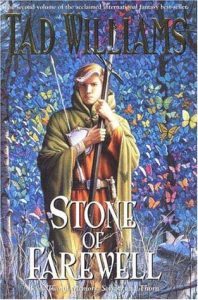 All of this was quite standard fare for the time period. So why did this one work so well? The characters are strong and engaging and always human. Simon has a very realistic, slow character arc. There is no single thing that happens to him that changes him, but an endless supply of events that shift him from being a ‘mooncalf’ to being a hero. Even near the end you still see flashes of early Simon’s attitude, which the more mature Simon quickly stamps down on. Prince Josua is a reluctant leader, and one who clearly dislikes the role and only seems willing to do it as his brother is becoming more erratic. Miriamele, Isgrimnur, and Binabik all have lives and desires that are being changed due to the war. Even the side characters seem fleshed out and real. Cadrach is the most famous of these, a self-loathing priest who was originally supposed to be a quick one-off character who became integral to the plot.
All of this was quite standard fare for the time period. So why did this one work so well? The characters are strong and engaging and always human. Simon has a very realistic, slow character arc. There is no single thing that happens to him that changes him, but an endless supply of events that shift him from being a ‘mooncalf’ to being a hero. Even near the end you still see flashes of early Simon’s attitude, which the more mature Simon quickly stamps down on. Prince Josua is a reluctant leader, and one who clearly dislikes the role and only seems willing to do it as his brother is becoming more erratic. Miriamele, Isgrimnur, and Binabik all have lives and desires that are being changed due to the war. Even the side characters seem fleshed out and real. Cadrach is the most famous of these, a self-loathing priest who was originally supposed to be a quick one-off character who became integral to the plot.
Moreover, the setting of Memory, Sorrow, and Thorn feels real. A common complaint is that little happens in the opening sequence of The Dragonbone Chair. All of that is scene-setting, and giving the reader an understanding of how the world works, and invests us in the setting.
The setting is a standard medieval one, but one that goes both deep and wide. The map is large enough to host everything from icy mountains to deep, huge forests to swamps, and the journey between them feels as if it takes time. Williams’ description of each of these is crisp and evocative.
There are a few sections of the book that feel as if they are there to remind the reader that this is happening across the continent, not simply to a few characters. Several characters have a few scenes in distant lands throughout the first two books that become significantly more important by the third, but those opening scenes reinforce the scale of the setting.
The religion of the setting, Aedonism, is quite close to Catholicism. Much like the setting, it is standard, but it’s not set-dressing; it’s an essential part of a medieval worldview, and one that permeates most of the characters. When a plot point is resolved through the use of confession, it feels right, even if confession was not brought up until that moment as a part of this religion.
The three swords that the series is named after, Memory, Sorrow, and Thorn, all have a prophesy surrounding them: Three Swords must come again. There is a group of scholars who call themselves the League of the Scroll who attempt to puzzle out what the riddle means throughout the story. These three weapons were all forged with materials from outside Osten Ard. Sorrow was made by the Norns, Thorn from a meteor, and Memory was forged from the hulls of boats that made their way to this new land.
Tad Williams is currently working on The Navigator’s Children, the last book of a sequel series to this, titled The Last King of Osten Ard. That means now is a great time to go back and revisit this series.
Read Memory, Sorrow, and Thorn
The post REVIEW: Memory, Sorrow, and Thorn by Tad Williams appeared first on Grimdark Magazine.
June 18, 2021
REVIEW: A Quiet Place
A Quiet Place is a 2018 horror film directed by – the man once known as Jim from The Office. The story follows a father (Krasinski) and mother (played by Krasinski’s real wife Emily Blunt), as they attempt to protect their children from ruthless, blind monsters with an acute sense of hearing.
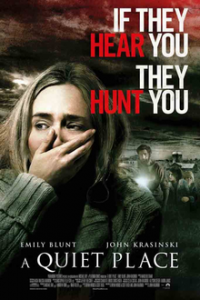 A Quiet Place is a unique movie that uses sound in a way that few other movies have in the past. The Abbott family consists of husband Lee, wife Evelyn, sons Marcus and Beau, and deaf daughter Regan. The movie, directed by Krasinski, plays on the dynamics of having a family confident in the use of sign language who are tasked with staying as quiet as possible to stay alive. A year after the invasion of the strange and deadly creatures, the family are struggling to survive in a decimated, almost post-apocalyptic world. The brutality of the world is shown with a swift and gruesome death early on that I won’t spoil here. Needless to say, this world is grimdark to the core and only the cunning and innovative members of humanity will survive.
A Quiet Place is a unique movie that uses sound in a way that few other movies have in the past. The Abbott family consists of husband Lee, wife Evelyn, sons Marcus and Beau, and deaf daughter Regan. The movie, directed by Krasinski, plays on the dynamics of having a family confident in the use of sign language who are tasked with staying as quiet as possible to stay alive. A year after the invasion of the strange and deadly creatures, the family are struggling to survive in a decimated, almost post-apocalyptic world. The brutality of the world is shown with a swift and gruesome death early on that I won’t spoil here. Needless to say, this world is grimdark to the core and only the cunning and innovative members of humanity will survive.
Krasinski plays a role in A Quiet Place that is similar to those seen in stories such as The Road (Viggo Mortensen’s Man), The Last of Us (Troy Baker’s Joel), and Logan (Hugh Jackman’s Wolverine). Weary, grumpy, but determined to keep those he cares for alive, he trains his family to survive and teaches them what he knows to ensure that they will be able to live on once he is gone. Each actor/actress is cast to perfection in the film, with the family feeling as though they truly care for one another and they will go to the ends of the earth to protect each other. They have their disagreements, like all families, but they overcome these to be stronger as a unit.
Krasinski has likened A Quiet Place to a two-hour version of the scene in Jurassic Park where the raptors are stalking the kids in the kitchen. The tension holds throughout the two hours and Krasinski shows a deft hand as director with scenes that call back to Hitchcock and Spielberg, masters of tension and horror, as he builds the suspense throughout and his use of foreshadowing to raise tension is unparalleled this century. When watching the film in the cinema (the perfect place for such a tense movie), people delayed eating their popcorn until after the movie as they were so drawn in by the eerie silence held through most of the film and even a pin would have been heard had it been dropped. Krasinski has his audience in the palm of his hand and he sets each scene up like a master director in the prime of his work and he then manages to nail each scene with perfection, drawing gasps, screams, and cries of horror from those watching. A Quiet Place is a perfect example of tension building and suspense in horror without having to jump to gore and violence. Each scene is perfectly put together to draw the most out of its nervous audience.
Dystopian worlds are nothing new, but A Quiet Place uses sound to stand out from the crowd. Unable to speak due to the monsters all around them, the characters are forced to use their expressions and sign language to convey heavy emotion and carry scenes that pull on the heartstrings. It forces the actors involved to step up and thankfully, as mentioned earlier, the cast is more than up to the task. Both John Krasinski and Emily Blunt knock it out of the park as the parents struggling to hold their family together in a broken world and Millicent Simmonds is surely a breakout star and one to watch for the future as she plays the strong, determined Regan.
A Quiet Place is thoughtful horror with a heart. Two hours of tension may have taken years off of my life but I feel it was worth every moment. A Quiet Place is a unique film that stands out as one of the best horrors of all time and is proof that there are still new ideas to be mined in a genre that has at times appeared to turn stale. It is a masterpiece that deserves to be seen by as wide an audience as possible.
The post REVIEW: A Quiet Place appeared first on Grimdark Magazine.
June 17, 2021
REVIEW: Vampire: The Masquerade – Winter’s Teeth #7
Winter’s Teeth #7 is the seventh issue (fancy that) in the adaptation of the tabletop roleplaying game, Vampire: The Masquerade, to comic format. The comic follows the adventures of Cecily Blake, a former Anarch turned Camarilla enforcer as she deals with the fact she’s betrayed everything in her life to look after her ailing sister. Unfortunately, her sister has developed incurable dementia and she finds herself dealing with the consequences of her decision.
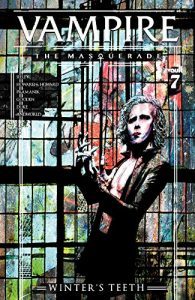 One of those decisions was to adopt orphaned Cainite, Alejandra, who was found confused and wandering through the Twin Cities without any knowledge of the supernatural. Or so it seemed. Since her introduction, Alejandra has been hiding the secret of being a vampire hunter turned into one of the undead. However, unlike most hunters turned undead, becoming a vampire has not impacted her quest to destroy them. Or has it?
One of those decisions was to adopt orphaned Cainite, Alejandra, who was found confused and wandering through the Twin Cities without any knowledge of the supernatural. Or so it seemed. Since her introduction, Alejandra has been hiding the secret of being a vampire hunter turned into one of the undead. However, unlike most hunters turned undead, becoming a vampire has not impacted her quest to destroy them. Or has it?
In Winter’s Teeth #7 Cecily finds herself unable to decide what to do about the possibility that she is hiding a Fifth Column agent in her midst. Thus, she sets about to try to find proof of her suspicions one way or another. Before then, though, she leaves Cecily in the hands of her frenemy, Calder Wendt, who wants Ali for her ability to resist mental domination. Calder is about to become Prince of the Twin Cities but must first be approved by a Justicar. Calder is unable to hide how terrifying he finds this prospect and is going out of his way to provide the visiting dignitary with every possible luxury.
One of these luxuries is to be provided with multiple vessels to slake his immortal thirst. This comes from mortals who have been caught breaking the Masquerade. Ali finds out that Cecily’s sister’s nurse is one of the humans meant to be devoured and decides to mount a rescue plan with Calder Wendt. It goes horribly-horribly wrong and is one of the better displays of horror in the series so far, even if they go a bit far by portraying the vampire slavers as sadistic BDSM villains straight out The Road Warrior.
I won’t spoil Winter’s Teeth #7 for readers but I think that if they continue to incorporate horrifying displays of vampirism like they included in this book then it will quickly win over its detractors. The book has been a bit on the tame side so far so seeing vampires “play” with their food the way they do in this book is something that helps highlight them as monsters. The ending was a bit silly as they keep trying to portray hunters as even more deranged and evil than the undead, which I just don’t see. Still, I am looking forward to seeing what happens next.
In conclusion, Winter’s Teeth #7 is another solid issue of the series. There’s another side story in the back, detailing Colleen adjusting to life in Minneapolis. Colleen is a Thin Blood without many of the hang ups of Cecily or her fellow undead. Here, she finds out about Thin Blooded Alchemy that has the potential to change her from being the weakest of her kind to someone actually capable of affecting meaningful change. I’ll be interested in seeing where that plot goes. As always, the writing is top notch and the art is excellent.
Read Vampire: The Masquerade – Winter’s Teeth #7
The post REVIEW: Vampire: The Masquerade – Winter’s Teeth #7 appeared first on Grimdark Magazine.
June 16, 2021
REVIEW: The Resurrectionist of Caligo by Wendy Trimboli and Alicia Zaloga
The Resurrectionist of Caligo is a rollicking fantasy filled with a little bit of blood and a whole lot of adventure and intrigue. The book (which has Victorian mystery vibes) follows, Roger, a wanna-be surgeon who earns a little extra on the side by virtue of his willingness to liberate a cadaver or two from the local cemetery- all for the sake of science, of course. Unfortunately for Roger (but fortunately for the reader), he picks the wrong cadaver and finds himself accused of murdering, not just one, but several women. Things are looking grim for Roger, but he is saved from the noose by his childhood sweetheart, who binds him to her in a magical ritual, proof that “things can always get worse”.
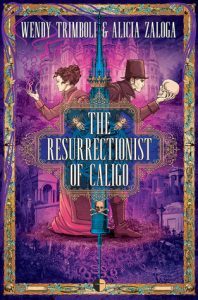 Sibylla, Roger’s childhood crush, also happens to be royalty. In The Resurrectionist of Caligo, royal blood is proven by the magic that all royalty possesses. I love the magic in this book! It is so very different. I am used to magic that can blast open doors or make someone float. Sibylla’s magic is slightly less…flashy. She has ink that flows from under her fingertips, useful when one needs to write a letter, but an author needs to be creative for magic such as that to work. The authors managed it beautifully. Sibylla does the only thing she can to save her childhood friend from hanging for a crime (she is pretty sure) he didn’t commit. Together, Sibylla and Roger need to figure out who the killer is- before they strike again.
Sibylla, Roger’s childhood crush, also happens to be royalty. In The Resurrectionist of Caligo, royal blood is proven by the magic that all royalty possesses. I love the magic in this book! It is so very different. I am used to magic that can blast open doors or make someone float. Sibylla’s magic is slightly less…flashy. She has ink that flows from under her fingertips, useful when one needs to write a letter, but an author needs to be creative for magic such as that to work. The authors managed it beautifully. Sibylla does the only thing she can to save her childhood friend from hanging for a crime (she is pretty sure) he didn’t commit. Together, Sibylla and Roger need to figure out who the killer is- before they strike again.
The Resurrectionist of Caligo has a smaller cast of characters, and each person is important. Sibylla is clever, but also a bit naive. To be fair, she hasn’t had a lot of life experience. Her storyline provides the fine details that flesh out the broader plotline, giving little hints to a larger mystery. I found the intrigue and the family sniping interesting, but it was Roger who stole the show in my opinion.
Roger is a down-on-his-luck guy just doing the best he can with what he has. He is a good guy whose morality is a little fluid. His kindness shows in his small ways, such as his relationship with Ghostofmary (who I adore, by the way). His sole hope is to become a licensed doctor, but that requires an education that he can’t afford. He swipes corpses to pay his bills and finagle his way into lectures from surgeons. The knowledge he has provides the broad strokes to the story. His medical expertise, as it were, adds an extra level of fun to an already ghoulishly entertaining tale.
Sibylla and Roger actually share very few pages. Instead, most of their interactions come through misunderstood letters and convoluted messages from third parties. It was truly delightful to see the characters’ frustrations and anger over things that were completely misinterpreted. Add in angry magic-ink bees, and it becomes a singularly entertaining way to develop character relationships.
The Resurrectionist of Caligo is a brilliant must-read for fans of books the include grimy, smog-filled streets, shady doings, and ridiculously fun characters.
Read The Resurrectionist of Caligo by Wendy Trimboli and Alicia Zaloga
The post REVIEW: The Resurrectionist of Caligo by Wendy Trimboli and Alicia Zaloga appeared first on Grimdark Magazine.
REVIEW: The Resurrectionist of Caligo by Wendi Trimboli and Alicia Zaloga
The Resurrectionist of Caligo is a rollicking fantasy filled with a little bit of blood and a whole lot of adventure and intrigue. The book (which has Victorian mystery vibes) follows, Roger, a wanna-be surgeon who earns a little extra on the side by virtue of his willingness to liberate a cadaver or two from the local cemetery- all for the sake of science, of course. Unfortunately for Roger (but fortunately for the reader), he picks the wrong cadaver and finds himself accused of murdering, not just one, but several women. Things are looking grim for Roger, but he is saved from the noose by his childhood sweetheart, who binds him to her in a magical ritual, proof that “things can always get worse”.
 Sibylla, Roger’s childhood crush, also happens to be royalty. In The Resurrectionist of Caligo, royal blood is proven by the magic that all royalty possesses. I love the magic in this book! It is so very different. I am used to magic that can blast open doors or make someone float. Sibylla’s magic is slightly less…flashy. She has ink that flows from under her fingertips, useful when one needs to write a letter, but an author needs to be creative for magic such as that to work. The authors managed it beautifully. Sibylla does the only thing she can to save her childhood friend from hanging for a crime (she is pretty sure) he didn’t commit. Together, Sibylla and Roger need to figure out who the killer is- before they strike again.
Sibylla, Roger’s childhood crush, also happens to be royalty. In The Resurrectionist of Caligo, royal blood is proven by the magic that all royalty possesses. I love the magic in this book! It is so very different. I am used to magic that can blast open doors or make someone float. Sibylla’s magic is slightly less…flashy. She has ink that flows from under her fingertips, useful when one needs to write a letter, but an author needs to be creative for magic such as that to work. The authors managed it beautifully. Sibylla does the only thing she can to save her childhood friend from hanging for a crime (she is pretty sure) he didn’t commit. Together, Sibylla and Roger need to figure out who the killer is- before they strike again.
The Resurrectionist of Caligo has a smaller cast of characters, and each person is important. Sibylla is clever, but also a bit naive. To be fair, she hasn’t had a lot of life experience. Her storyline provides the fine details that flesh out the broader plotline, giving little hints to a larger mystery. I found the intrigue and the family sniping interesting, but it was Roger who stole the show in my opinion.
Roger is a down-on-his-luck guy just doing the best he can with what he has. He is a good guy whose morality is a little fluid. His kindness shows in his small ways, such as his relationship with Ghostofmary (who I adore, by the way). His sole hope is to become a licensed doctor, but that requires an education that he can’t afford. He swipes corpses to pay his bills and finagle his way into lectures from surgeons. The knowledge he has provides the broad strokes to the story. His medical expertise, as it were, adds an extra level of fun to an already ghoulishly entertaining tale.
Sibylla and Roger actually share very few pages. Instead, most of their interactions come through misunderstood letters and convoluted messages from third parties. It was truly delightful to see the characters’ frustrations and anger over things that were completely misinterpreted. Add in angry magic-ink bees, and it becomes a singularly entertaining way to develop character relationships.
The Resurrectionist of Caligo is a brilliant must-read for fans of books the include grimy, smog-filled streets, shady doings, and ridiculously fun characters.
Read The Resurrectionist of Caligo by Wendi Trimboli and Alicia Zaloga
The post REVIEW: The Resurrectionist of Caligo by Wendi Trimboli and Alicia Zaloga appeared first on Grimdark Magazine.
June 15, 2021
REVIEW: The Coward by Stephen Aryan
Before I dive into this review, I want to say a big thank you to Stephen Aryan for sending me a review copy of The Coward. He is a great guy, go check out his fantastically helpful Youtube channel if you are an aspiring writer!
 The Coward is a mashup of everything that is good about modern fantasy and everything that is good about traditional fantasy. It has a rapidly moving plot, witty dialogue and humour that sucks you in, humanly real and relatable characters that keep you invested, and the promise of a quest of the ages. Now, as someone who loves Nicholas Eames’ Kings of the Wyld, I was immediately hooked with Aryan’s similar colloquial and witty style. As someone who has also read David Gemmell’s hearty, human and heroic characters, I couldn’t put The Coward down.
The Coward is a mashup of everything that is good about modern fantasy and everything that is good about traditional fantasy. It has a rapidly moving plot, witty dialogue and humour that sucks you in, humanly real and relatable characters that keep you invested, and the promise of a quest of the ages. Now, as someone who loves Nicholas Eames’ Kings of the Wyld, I was immediately hooked with Aryan’s similar colloquial and witty style. As someone who has also read David Gemmell’s hearty, human and heroic characters, I couldn’t put The Coward down.
Stephen Aryan has created a partially fresh, and somewhat comforting read in The Coward. It is unique in its own right – tackling themes such as characters not really being *heroes* but being people who make heroic choices, an exciting fantasy world teeming with life and carefully crafted relationships. He has also taken what may have initially pulled readers over to fantasy. A quest, a group of strangers becoming a formidable crew, rich world building where anyone can be anything, and an escape from reality.
Kell Kressier, our main POV, has already been on a quest, back when he was a young 17 year old boy. He’s been there, done it, got the t-shirt, and now wants to live out the rest of his life as a simple farmer. But life isn’t that simple. Being a famous warrior of the sword, Kell cannot escape his past. It turns out that the quest he completed all those years ago was left unfinished. Now it’s up to him to face the Ice Lich once more – but the rest of his crew died facing her. It won’t be as simple this time around.
Without going more into the plot, just know it is incredibly satisfying. Kell is a great protagonist, feeling like just a normal guy, not really the legend everyone believes he is. The people he meets on his journey add whole new layers to The Coward and the relationships they form are the backbone of why this book is so great, in my opinion. To me, characters come before world-building, even before plot. When you have characters written as well as in The Coward, then you’re onto a winner; these characters are flawed, quirky, have their moments to shine and they bring something new and fun to the book.
What’s more is that the tension builds excellently, the ending is top notch, it sets up book 2 really nicely and the combat is brilliant. There are all manner of horrid fantasy beasts and creatures that fans of The Witcher will enjoy, plus the world-building teases an interesting world that I would love to see even more of. Aryan has balanced everything fantastically, teasing enough pieces of the puzzle here and there to show the full potential of the world in which The Coward is set.
All in all, The Coward is a fun and personal tale that adds a new and modern twist on the ‘heroes’ trope. ‘Kings of the Wyld’ meets Gemmell’s ‘Legend’. We definitely need more books like this in fantasy!
Read The Coward by Stephen Aryan
The post REVIEW: The Coward by Stephen Aryan appeared first on Grimdark Magazine.
June 14, 2021
ANNOUNCEMENT: The King Must Fall goes live today!
Today, our new Kickstarter anthology The King Must Fall goes live!

The King Must Fall is a dark fantasy anthology featuring 14+ authors writing about rogues, assassins, mages, blackguards, and warriors on quests to kill their kings, rulers, and leaders. We’ll be offering ebook, hardcover, numbered signed edition hardcovers, and a leatherbound signed lettered edition.
Wrapped in Felix Ortiz’s beautiful cover art, designed by the legendary Shawn King, and with a stretch goal to fill it with Carlos Diaz’s interior art, The King Must Fall will be a gripping read and an eye-catching addition to your bookshelf.
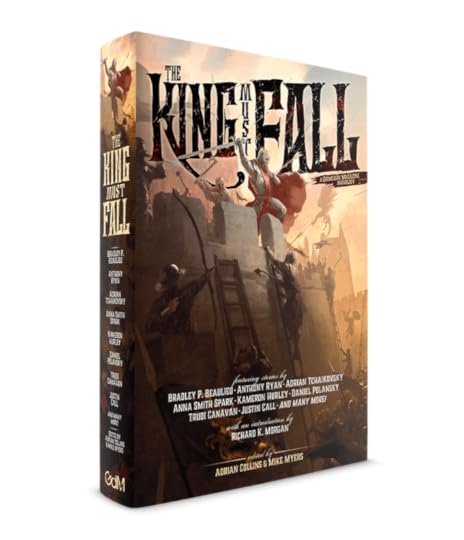

We have an epic line-up of authors from epic, dark, and grimdark fantasy whose list of awards, best-sellers, and accolades is as long as your polearm:Bradley P. Beaulieu (The Song of the Shattered Sands, The Lays of Anuskaya)Kameron Hurley (The God’s War Trilogy, Worldbreaker Saga)Michael R Fletcher (Manifest Delusions, Black Stone Heart)Anna Smith Spark (Empires of Dust)Shawn Speakman (The Annwn Cycles, Unfettered)Daniel Polansky (Low Town, Those Above)Devin Madson (The Reborn Empire)Adrian Tchaikovsky (Shadows of the Apt, Children of Time)Anthony Ryan (Raven’s Shadow, The Draconis Memoria)Lee Murray (Into the Mist, Hounds of the Underworld)Jeremy Szal (The Common)Justin Call (The Silent Gods)Trudi Canavan (The Black Magician, Age of the Five)Peter Orullian (The Vault of Heaven, The Astonishing)Stretch Goal AuthorsOne of the best parts of Kickstarter anthologies is building on that author list. The following authors have all committed to joining the anthology based on the below stretch goals.Anna Stephens (Godblind, The Songs of the Drowned)Alex Marshall (The Crimson Empire)Deborah A. Wolf (The Dragon’s Legacy, Split Feather)Luke Scull (The Grim Company)Matthew Ward (Legacy trilogy)

The above authors and the print run of The King Must Fall are just the beginning. Help us grow this project by sharing it with your friends so that we can make it even bigger and better with interior artwork, more great authors, and free e-books bundled with print copies to give you more bang for your buck.
Financial stretch goalsAU$36,500 (US$28,200 approx.): Carlos Diaz will create a 1/3rd black and white illustration to go on the title page of every short story.
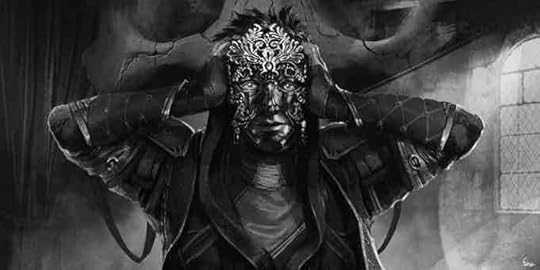
[image error]
PLAYAU$50,000 (US$38,800 approx.): Deborah A. Wolf will write an additional short story based in the Godsword world.AU$54,000 (US$41,800 approx.): Author pay increase by another AU$0.02 per word.AU$57,000 (US$44,100 approx.): Matthew Ward will write an additional short story based in the Legacy world.AU$61,000 (US$47,200 approx.): Author pay increase by another AU$0.02 per word.AU$65,000 (US$50,300 approx.): Open window for fiction submissions at full pay rate for one short story purchase from the slush pile.Backer number stretch goalsWe’ve also got a few backer numbers goals thanks to our contributors to reward your awesomeness as we hit 350, 400 and every hundred after that. All book rewards are in ebook format.350 BACKERS: 2018 Issue Bundle from Grimdark Magazine. Every e-issue published in 2018 in mobi, ePub, and PDF formats.400 BACKERS: 2019 Issue Bundle from Grimdark Magazine. Every e-issue published in 2019 in mobi, ePub, and PDF formats.500 BACKERS: 2020 Issue Bundle from Grimdark Magazine. Every e-issue published in 2020 in mobi, ePub, and PDF formats.600 BACKERS: Evil is a Matter of Perspective in mobi, ePub, and PDF formats.700 BACKERS: Black Stone Heart and Smoke and Stone ebooks by Michael R. Fletcher.800 BACKERS: The entire SNAFU military SF horror catalogue from Cohesion Press in mobi and ePub. You’ll know some of these stories from Netflix’s LOVE, DEATH + ROBOTS.

Wondering just where in all the levels of hell the damned extra goodies are that come with the backer tiers of other Kickstarters? We’ve made the call to push all extra coin back into creating book content–stories, art, and paying contributors. However, not having that artwork in every facet of your life would be a crime. So here’s a couple of add-ons for you to sink your teeth in to.Bookmark: Want something pretty to mark your place in THE KING MUST FALL without being a page-folding monster? Use a bookmark featuring the awesome artwork by Felix Ortiz and there’s no need to doggy ear your gorgeous anthology! $5AUD ($3.50USD)Extra Hardcover: Need to stock up on birthday presents? Got a mate who hasn’t had their eyes opened to grimdark? Like the weight and aerodynamics of our tome as a projectile? Then grab yourself a cheeky extra hardcover. $35AUD ($27USD) The extra hardcover is limited to one per backer and requires that you double your postage amount in Backerkit. Make sure to factor this in to your backing commitment and to use the backer survey to let us know what all the extra money is for!

As we hit our target and surge towards stretch goals and make it rain rewards, I’ll keep you updated below.
The post ANNOUNCEMENT: The King Must Fall goes live today! appeared first on Grimdark Magazine.
June 13, 2021
REVIEW: The Goblin Emperor by Katherine Addison
The Goblin Emperor by Katherine Addison is many things; a novel about elves and goblins, a story with mages and magic, and a book with a steampunk aesthetic. Yet, these belie what the novel is at its heart: a coming-of-age story filled with political intrigue. There is action but it is not central. Magic exists but plays a minor role relegated to the background to fill out the world. The Goblin Emperor upends standard fantasy by shifting the importance of its components. Whereas intrigue, fish-out-of-water syndrome, and world-building often play second fiddle to action, monsters, and magic, Katherine Addison has flipped the script in this novel which, for all intents and purposes, makes for a story that shouldn’t work, but somehow succeeds.
“The reminder that other lives had tragedies without reference to his own was both salutary and painful.”
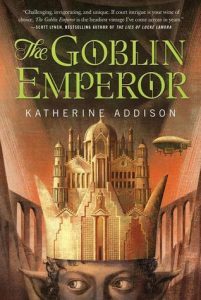 The Goblin Emperor starts with the main character, Maia, in his exiled residence from his neglectful father and the royal court. Maia is mixed in race, half-goblin and half-elf, with appearances leaning more toward the former. His father the emperor hates him on principle, as Maia was the result of an arranged and loveless marriage for political benefit, and thus sent both wife and son away into exile the first chance he got.
The Goblin Emperor starts with the main character, Maia, in his exiled residence from his neglectful father and the royal court. Maia is mixed in race, half-goblin and half-elf, with appearances leaning more toward the former. His father the emperor hates him on principle, as Maia was the result of an arranged and loveless marriage for political benefit, and thus sent both wife and son away into exile the first chance he got.
“Better to build new bridges, he thought, than to pine after what’s been washed away.”
Maia is technically an heir to the throne but is low on the list with siblings ranking far higher in terms of succession and favor. Yet, this comes crashing down when the emperor’s airship comes… er, crashing down, killing the entire family and leaving Maia as the de facto emperor. This moment is where the novel begins, but the cataclysmic start pulls back to reveal the details in Maia’s past as well as what he lacks.
“‘In our inmost and secret heart, which you ask us to bare to you, we wish to banish them as we were banished, to a cold and lonely house, in the charge of a man who hated us. And we wish them trapped there as we were trapped.'”
The Goblin Emperor has an onerous glossary of characters, forms of address, and oddly spelled and pronounced names. This is intentional, as the reader will feel lost at times just as the young emperor does. This can grate at times, especially for those who wish to understand everything, but I quite enjoyed being swept up in the world along with Maia. This being said, there are also some steadfastly feel-good moments and characters to balance out the experience. Specifically, the relationship Maia has with his dutiful and traumatized secretary, Csevet, and his relationship with his two private guards Cala and Beshelar (called Nohecharei) are standout relationships that anchor the story of The Goblin Emperor.
“Maia screamed and woke.
‘Serenity?’ Cala’s voice, Cala’s angular shape outlined against the window.
‘ ‘Tis an ironic title, in sooth,’ Maia said feebly, realizing that the entangling garments of the nightmare were merely his bedsheets. His heart was hammering, and he was clammy with sweat.”
Though not grimdark in the traditional sense, The Goblin Emperor is a subversive novel that shows the ugly and bureaucratic underbelly of what it is like to be emperor in a world that does not want you. This, for me anyway, captures the spirit if not necessarily the aesthetic of grimdark. Overall, I highly recommend The Goblin Emperor to anyone looking for a different kind of fantasy novel.
Read The Goblin Emperor by Katherine Addison
The post REVIEW: The Goblin Emperor by Katherine Addison appeared first on Grimdark Magazine.
June 12, 2021
REVIEW: A Quiet Place Part II
A Quiet Place Part II picks up from the shocking events of the 2018 horror film directed by John Krasinski. Following the death of Lee, the Abbott family move through the land still decimated by the blind monsters from the first film, using their newly discovered defence against the monsters – amplifying the feedback from Regan’s hearing implant as shown in the first film.
A Quiet Place Part II had a high bar to hit following the unique, powerful original was both a commercial and critical success. With leading man John Krasinski’s character killed off, it was always going to be difficult to reach the peaks of the original. Adding in the fact that the film was delayed over a year due to the Covid pandemic and with this film being one of the first releases in cinemas in some time, the pressure was on. However, A Quiet Place Part II manages to keep to the high standard set by the original and build on the interesting world and concept introduced in 2018. It is a rare example of a sequel doing what was done right first time round whilst adding further layers to expand on the lore without taking anything away – a method often referred to as the Aliens approach, and that comparison shows just how good this film is.
Many films would struggle to do well after killing off its leading man. Thankfully, the always brilliant Cillian Murphy (Peaky Blinders, 28 Days Later, Inception) is on hand to carry the film forwards with the still excellent surviving members of the cast. He steps into the shoes vacated by John Krasinski and plays the character of Emmett to perfection. A weary, hardened survivor on the cusp of giving up on the world, he is woken from his grief and pessimism by the hope found in the Abbott family as they fight to survive with the new addition to their team. Once again it is Millicent Simmonds who shines as Regan, the hopeful deaf daughter with a will to survive. In A Quiet Place Part II, she takes on more of a leading role and it is the relationship between her and Emmett that is at the heart of the film and allows the audience to open their eyes to an expanding world where even the slightest sound could mean death. Her stubborn determination to survive and to help others is what helps Emmett’s character to grow and it is a joy to watch every step of the way – even as the film kept my blood pressure high with the familiar constant tension and expectation of horror in almost every shot.
As I mentioned with the first film, A Quiet Place Part II is a masterclass in the use of sound and direction. Every shot is carefully structured and the use of sound should be an example in every class for students of film. The flashback scene recalling the events of the first day of the attack is one of the best scenes I have watched in a cinema and the way it jumps from Lee to Regan, showing the different ways they visualize the attack and the way hearing effects their behaviour is stunning and proves that Krasinski more than a trusted pair of hands behind the camera. Again, there are elements of Spielberg and Hitchcock in the way the movie is directed but never in a derivative way. There are also a couple of car chase scenes with high-octane action to add to the simmering building of tension throughout the film and this adds a different element to film when compared to A Quiet Place.
A Quiet Place Part II has just as much heart, if not more, than the original. It is a beautiful film with death, violence, true jump-out-of-your-seat scares and all the suspense and tension you would expect if you have seen the first one. The excellent cast are all on top form and make you cheer for them as they fight to survive in such a difficult world. Krasinski has crafted another pitch-perfect film and with that abrupt ending, I hope that there will be one more to complete this trilogy.
The post REVIEW: A Quiet Place Part II appeared first on Grimdark Magazine.

